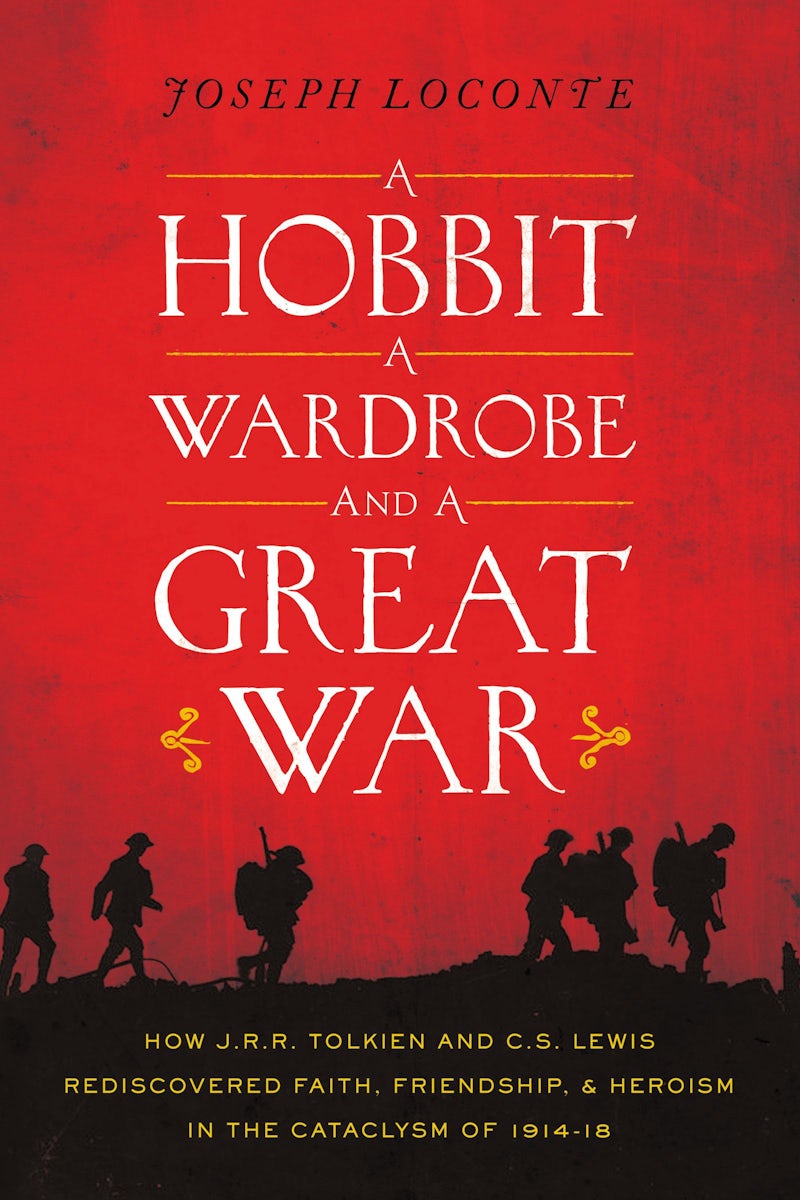A Hobbit, a Wardrobe, and a Great War: How J.R.R. Tolkien and C.S. Lewis Rediscovered Faith, Friendship, and Heroism in the Cataclysm of 1914-1918 by Joseph Loconte

(Nashville: Nelson Books, 2015), 196
- "Democratic citizenship requires knowledge of war." (xvii)
- Lewis: "We know from the experience of the last twenty years that a terrified and angry pacifism is one of the roads that leads to war." (xviii)
- J.R.R. Tolkien and C. S. Lewis fight back against "The Myth of Progress" (2)
- Lewis and Tolkien's works both show the historic Christian tradition: "human nature is a tragic mix of nobility and weakness....all stories are ultimately about the fall" (21)
- The Thirty Years War as a prelude to WWI (27-29)
- Interesting observation from Lewis: "All those who have the courage to do so and are physically sound, are going off to be shot: those who survive are moral and physical weeds—a fact which does not promise favorably for the next generation." (32)
- War doesn't guarantee peace: "the forces of evil would not be eradicated by the next battle" (50)
- Tolkien: the character of the hobbit was a reflection of the ordinary British soldier (75)
- Lewis had the images of the gruesome nature of war emblazoned in his mind from The Iliad (81)
- Phantastes: A Faerie Romance by George MacDonald was immensely influential for Lewis (82)
- Winston Churchill: "There never was a time when the inherent virtue of human beings required more strong and confident expression in daily life." (100)
- Three plagues launched by WWI: the Spanish influenza, atheistic communism, and fascism (111-113)
- Freudian psychology, the new hedonism, and the loss of faith after WWI (115-120)
- Owen Barfield convinced Lewis to abandon his "chronological snobbery: the assumption that the dominant intellectual fashion of the day makes every mode of thought from the past either suspect or irrelevant" (127)
- "Imagination might be as good a guide to reality as rational argument" (128)
- Tolkien: "mythmaking (mythopoeia) is a way of fulfilling God's purposes as the Creator." (131)
- Lewis' key conversion conversation with Tolkien in September 1931:
- Lewis: "Do you mean that the story of Christ is simply a true myth, a myth that works on us in the same way as the others, but a myth that has really happened? In that case, I begin to understand."
- Lewis: "If ever a myth had become fact, had been incarnated, it would be just like this. And nothing else in all of literature was just like this. Here and here only in all time the myth must have become fact." (133) (from Surprised by Joy)
- I've had a similar thought before as Lewis talking about his space trilogy: "If only there were someone with a richer talent and more leisure, I believe this great ignorance might be a help to the evangelization of England. Any amount of theology can now be smuggled into people's minds under cover of romance without their knowing it." (135)
- "The great achievement of Tolkien and Lewis is the creation of mythic and heroic figures who nevertheless make a claim upon our concrete and ordinary lives....It is their moral imagination that exerts a unique power: the proposition that every person is caught up in an epic contest between Light and Darkness." (138-139)
- Lewis: "Is any pleasure on earth as great as a circle of Christian friends by a good fire?" (179)
Bibliography
- The Father of us All by Victor Davis Hanson (xvii)
- Empire: The Rise and Demise of the British World Order by Niall Ferguson
- The World Crisis by Winston Churchill
- J.R.R. Tolkien: A Biography by Humphrey Carpenter
- The Thirty Years War: Europe's Tragedy by Peter Wilson (28)
- Phantastes: A Faerie Romance by George MacDonald (82)
Created: 2020-01-04
Updated: 2024-09-22-Sun